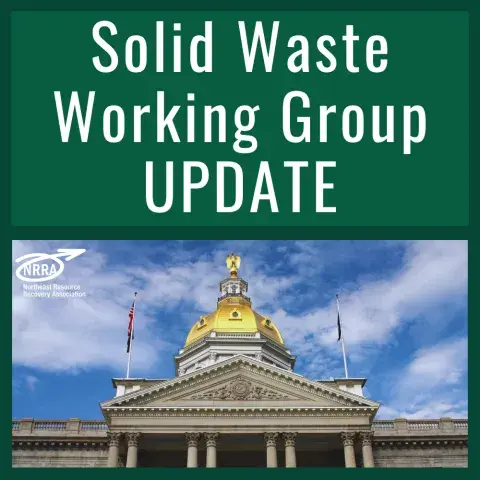
The NH Solid Waste Working Group (SWWG), which was established to assist NHDES with planning for New Hampshire's solid waste future, has issued their initial report.
The report focuses on nine priorities - or Focus Areas - for the upcoming year, as well as recommendations to adopt legislation to advance the Focus Areas listed below.
Focus Areas:
SHORT-TERM IMPLEMENTATION PLAN: The New Hampshire Department of Environmental Services (NHDES) plans to develop annual short-term implementation plans to prioritize actions, measure progress, and track timeframes for completion of the Solid Waste Management Plan (SWMP) goals and priorities.
The SWWG looks forward to providing input to NHDES on the development of its first short-term implementation plan.
WASTE CHARACTERIZATION & GENERATION STUDIES: The completion of waste characterization and generation studies are foundational to many other actions in the SWMP.
The SWWG will support, as appropriate, NHDES in applying for funding anticipated to become available from the Environmental Protection Agency under the Bipartisan Infrastructure Law to fund these studies.
FUNDING: Funding is an underlying issue that will determine the success in achieving almost all the goals identified in the Solid Waste Management Plan. Identifying reliable funding sources for NHDES’ solid waste management program will be important to ensure meaningful progress can be achieved.
The SWWG will discuss options for and make recommendations regarding ongoing funding sources.
EXTENDED PRODUCER RESPONSIBILITY: Extended Producer Responsibility (EPR) is a policy approach under which producers are given a significant responsibility – financial and/or physical – for the treatment or disposal of post-consumer products. Assigning such responsibility could in principle provide incentives to prevent wastes at the source, promote product design for the environment and support the achievement of public recycling and materials management goals.
The SWWG will discuss and explore legislation, including extended producer responsibility (EPR) programs, that would require product brands and manufacturers to enhance the recyclability of their products and packaging, and minimize the use of unnecessary materials and single-use plastics. This could also include EPR for per- and polyfluoroalkyl substances (PFAS) and other toxic chemicals.
OUT OF STATE WASTE: In 2020, of the 1,956,789 tons of solid waste disposed of in New Hampshire’s landfills and incinerators, 913,833 tons (about 47%) were generated outside New Hampshire. Legislators and members of the public have expressed significant concern about the receipt and disposal of out-of-state waste in New Hampshire.
The SWWG will discuss ways to reduce the amount of out-of-state waste entering New Hampshire for disposal. This will include reviewing and making recommendations regarding municipal solid waste plans and implementing the prohibition of any landfill in the state from accepting waste from a municipality that does not have a solid waste management plan.
INFRASTRUCTURE: Since the state’s solid waste management hierarchy was established in 1990, waste management infrastructure in New Hampshire has not significantly shifted from disposal toward more preferred management methods. The Solid Waste Management Plan anticipates that achievement of the disposal reduction goal will ultimately require development and strengthening of diversion infrastructure within the state. Significant financial investments are required from the public and private sectors to build infrastructure that expands capacity for reuse, recycling, composting, and other diversion methods across New Hampshire.
The SWWG will review and make recommendations regarding methods to increase such investment in solid waste diversion infrastructure in New Hampshire.
EDUCATION: Conducting robust outreach and education will ensure that messages are broadly disseminated to build public awareness and equip stakeholders with the best available information to guide actions and decision-making. One of the five strategies to advance the goals of the Solid Waste Management Plan is “public outreach, education, and technical assistance.”
The SWWG will review and make recommendations regarding ways to improve education regarding solid waste diversion.
FOOD WASTE & WASTE DISPOSAL BANS: Efforts to reduce and divert waste should focus on high-volume and weight materials. The U.S. Environmental Protection Agency (EPA) estimates that in 2018 the largest component of municipal solid waste disposed in landfills nationwide was food waste at 24.14%. While this figure is not New Hampshire specific, it serves as a general point of reference supporting the need to increase diversion of food waste from disposal.
The SWWG will review and make recommendations regarding ways to increase diversion of food waste in New Hampshire, including legislation related to waste disposal bans for food waste. SWWG will also consider landfilling bans on other solid waste materials.
TOXICITY: As found in the Solid Waste Management Plan, reducing the toxicity of the solid waste stream requires source reduction and diversion of household
hazardous wastes (HHW) and materials containing toxic chemicals, such as per- and polyfluoroalkyl
substances (PFAS).
The SWWG will discuss and make recommendations relative to ways to reduce the toxicity of the waste stream, such as PFAS, through source reduction, including legislation.
The SWWG will reconvene in the New Year to continue its work and further their initial report recommendations. You can read more about specific legislative recommendations being put forward by the SWWG Chair, Representative Karen Ebel (D-New London).
